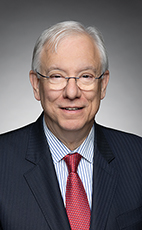

|
The Speaker of the House of Commons is the impartial "referee" of the Members of Parliament and is 5th on the Canadian Order of Precedence. The Speaker is elected by his or her colleagues by secret ballot and is responsible for keeping order and following protocol in the House. |
|
DutiesThe Speaker of the House of Commons has important responsibilities of a procedural, administrative, and ceremonial nature. He or she is elected by secret ballot by the whole House in a process overseen by the Dean of the House (the Member with the longest consecutive service who is not a Minister or Officer of the House). The Speaker must carry out his responsibilities in a non-partisan manner and with strict impartiality and can not vote on any motions unless there is a tie vote.As the chief presiding officer, he or she must maintain order in the Chamber and is responsible for procedural activities. The Speaker is also the Chairman of the Board of Internal Economy which is responsible for the administration of the 1500 House of Commons employees and its annual budget which exceeds $200 million. Moreover, the Speaker is the representative of the House of Commons in its relations with the Crown, the Senate, and authorities outside Parliament. In this capacity, he welcomes many visiting dignitaries and delegations and represents the House at national events and during visits abroad. In addition, the Speaker continues to carry out his or her responsibilities as a Member of Parliament for the their own riding constituents. The Honourable Francis ScarpaleggiaOn 26 May 2025, Members of the House of Commons elected the Honourable Francis Scarpaleggia as Speaker of the House of Commons. Francis has made the protection of Canada's freshwater a personal priority. With this goal in mind, he has tabled several water-related bills and motions in the House of Commons. In terms of legislation, he has introduced bills to ban bulk-water exports, prohibit the dumping of toxic mining waste into water bodies, and improve the process of developing Canada's drinking-water guidelines. He also initiated an in-depth study by the House of Commons environment committee into the impact of the oil sands on Canada's water resources and wrote The Hidden Dimension: Water and the Oil Sands, the Liberal report from the study.
Francis has made the protection of Canada's freshwater a personal priority. With this goal in mind, he has tabled several water-related bills and motions in the House of Commons. In terms of legislation, he has introduced bills to ban bulk-water exports, prohibit the dumping of toxic mining waste into water bodies, and improve the process of developing Canada's drinking-water guidelines. He also initiated an in-depth study by the House of Commons environment committee into the impact of the oil sands on Canada's water resources and wrote The Hidden Dimension: Water and the Oil Sands, the Liberal report from the study.Francis was recently the Chair of the House of Commons Standing Committee on Environment and Sustainable Development. Since first being elected, he has also served on the following House of Commons committees: Public Safety and National Security (Vice Chair); Transport; Canadian Heritage; and Government Operations and Estimates. He was also Chair of the House of Commons Special Committee on Electoral Reform. Francis was a founding member of the all-party Parliamentary Committee on Palliative and Compassionate Care. In this capacity, he organized and chaired hearings in Montreal in the fall of 2010 to hear testimony for the Committee's report entitled Not to be Forgotten: Care of Vulnerable Canadians. A leader among his colleagues, Francis was the longstanding elected Chair of the National Liberal Caucus (2011 to 2021). Before entering elected politics, Francis served as senior political attache to his predecessor, Clifford Lincoln, for over a decade. Prior to that, he taught business administration at Montreal's Dawson College. His time as an educator was preceded by several years working in the private sector, including as a corporate financial analyst. Francis did his undergraduate work in economics at McGill University and earned a master's degree in economics from Columbia University, in New York. He later obtained an MBA from Concordia University. Francis and his wife Jan have two daughters. |
